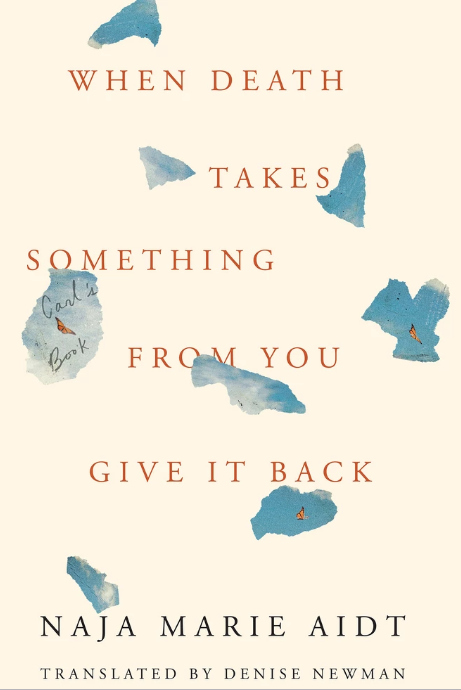

On March 16, 2015, Danish poet Naja Marie Aidt’s 25-year-old son, Carl, died in a sudden, tragic accident. Her new memoir, When Death Takes Something from You Give It Back (Coffee House Press) is a desolate, yet clear-eyed account of the days following Carl’s death: an event that changed Aidt’s understanding of language and loss.
The phone rings while Aidt is at dinner with her mother and Carl’s older brother, whose pregnant wife and three-year-old daughter are asleep upstairs. At first, they don’t bother to answer the phone, because who would be calling so late on a Saturday night? It is March; the night is cold. The family had been outside all day; now they talk and drink wine. The dog barks. The phone rings again, but again, they don’t pick up. Then all their phones start ringing at the same time.
Aidt’s reaction upon seeing Carl is that her living body has become an affront to “death’s heavy unbearable stillness.” She kisses Carl’s lifeless hand, which is “so cold that the coldness crept up into my face, my head, my skull…no heartbreak as cold as your hand; your hand which I kissed with my warm living mouth.”
Naja Marie Aidt was born in Greenland and moved to Copenhagen at the age of seven. She is an author, playwright, and translator with thirty works to her name. Among numerous honors, she has received the Danish Critics Choice Award and The Danish Art Foundation’s Award for Lifelong Service. In 2008, she won the prestigious Nordic Council Prize, Scandinavia’s highest literary honor, for her short story collection, Baboon. Denise Newman’s translation of the collection won the 2015 PEN Translation Prize.
“It’s not possible to write artistically about raw grief … words sit inadequate and silly on the lines, the lines stop abruptly on their own.” After Carl’s death destroys the language in her, Aidt turns to the words of other writers who’ve faced loss: Joan Didion, C.S. Lewis, Anne Carson, Nick Cave. She intersperses their words between old journal entries, poetry, and fragmented memories. For Aidt, grief feels like nothing and everything. It is a hummingbird flitting from one memory to the next. It turns language immoderate, imprecise. It hijacks the unconscious. It halts time’s forward movement, making it spiral out from the epicenter of grief.
As a result, the text of Aidt’s memoir is chaotic and restless. She switches, without warning, from one form to another—poetry, prose, criticism, journaling—and shatters genre convention by deploying all caps, unusual line breaks, varying font sizes, italicization, and run-on sentences. Denise Newman’s translation of this ephemeral text preserves its exquisite transience, like a paleontologist saving small fossils discovered between sediments of earth, before they are lost to sun and air.
Earlier in March, Carl and his roommate consumed psilocybin mushrooms they had been growing in a closet of their Copenhagen apartment. Carl, handsome, kind, six foot four inches, a film student, a “vegetarian who rarely drank alcohol… never did drugs, never suicidal,” suffered a psychotic break and leapt out the window. By time they got him to the hospital, he was already brain dead.
Philip Roth once wrote that, “to be alive is to be full of memory.” To be dead, then, must be to have no memory. After death, the people we loved become our memory. The fear of forgetting is what draws Aidt out of mourning to write about losing Carl to an accident so freakish it almost feels malevolent. “I’m afraid I’ll … forget the sensation of his body, his voice, his laughter. I’m afraid he will disappear from me more and more each day. That he will disappear in step with my healing.”
At Carl’s funeral, his older brother draws a parallel between Carl’s life and Aristotle’s theory of how a tragedy is structured, as he describes it in Poetics. “You chose a hero, someone you can identify with. A person, like anyone in the audience, with ordinary character traits and ordinary minor flaws, but who is one hair nobler, one hair better. That’s how Carl was.” The hero’s misfortune, Aristotle says, is brought about not by vice or depravity, but a fatal miscalculation or hamartia—in this case, the purchase and consumption of hallucinogenic mushrooms. Hamartia triggers peripeteia—a shift from good fortune to misfortune.
Aidt argues that no matter how we arrange our lives, hamartia and peripeteia wait in the wings of all human existence, like eager but patient understudies. “In antiquity, philosophers believed that fate was the expression of an unexpected casual sequence that humans simply could not perceive.” In this way, she defines grief as the continuing incredulous state of coming to terms with a sudden reversal of luck.
Aidt’s memoir brings home the truth that Denis Johnson once said: “Write naked. That means to write what you would never say. Write in blood. As if ink is so precious you can’t waste it. Write in exile, as if you are never going to get home again.” Aidt does all of this. Her pain is naked and vulnerable. She does not allow grief to wear a mask. Her words spill onto the page. When Death Takes Something from You Give It Back is a wild, sad howl for an unimaginable loss. A howl that comes from deep inside the heart of grief, sending a current of anguish and tenderness down the reader’s spine.
Naheed Patel is a graduate of the MFA program at Columbia University’s School of the Arts. Her writing has appeared in the New England Review, BOMB Magazine, PEN America, Quarterly Conversation, Asymptote Journal and Sou’wester Journal. She is at work on her debut novel and can be found online as @bookwalee
When Death Takes Something from You Give It Back: Carl’s Book
By Naja Marie Aidt, translated from the Danish by Denise Newman
Publisher: Coffee House Press
Paperback / 152 pages / 2019
ISBN: 978-1-56689-560-6
Published on September 10, 2019.




